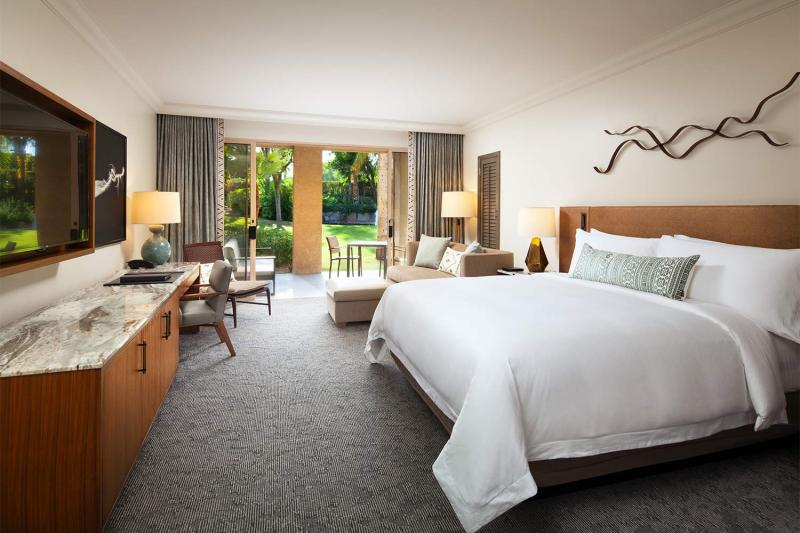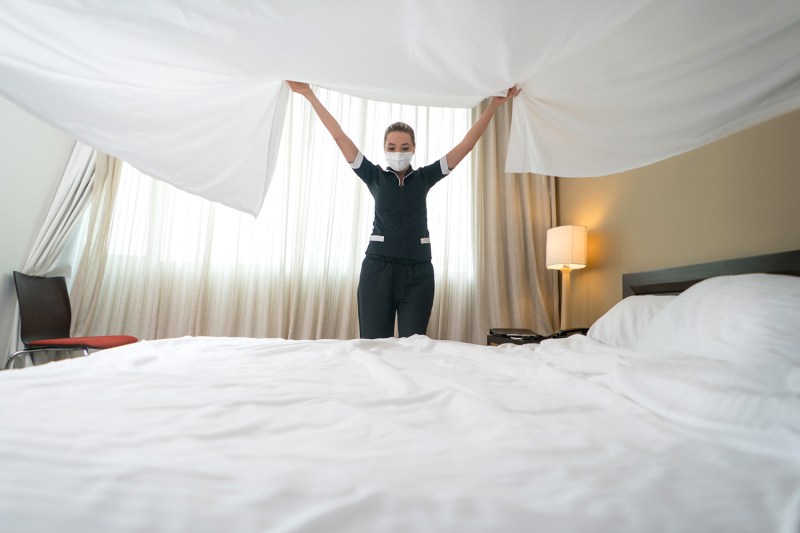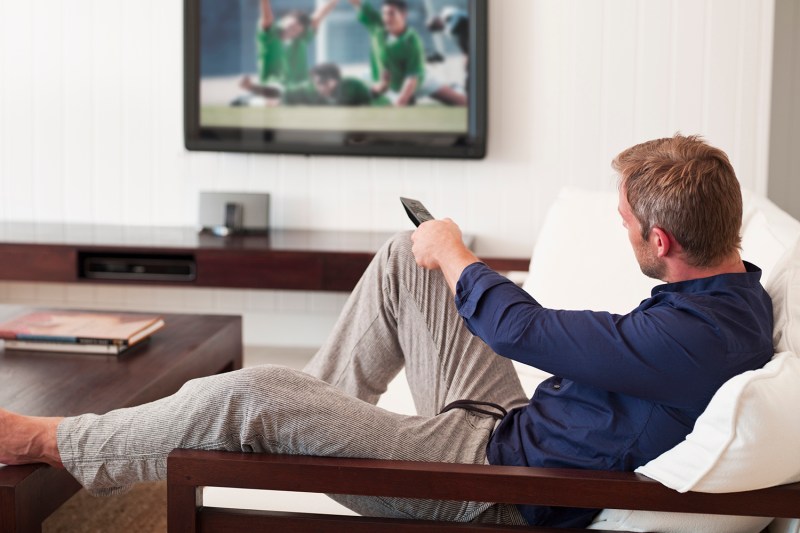
Let’s get straight to the point: are your hotel bedsheets clean?
Picture your next trip — sun and sand, maybe picturesque mountains, a great view from your hotel room where a comfy bed with fluffy pillows and the softest sheets beckon you. Peel back the covers, and everything looks amazing, but before you crawl in, take a minute. Are hotel sheets clean … really?
A 2016 investigation from Inside Edition uncovered a disturbing trend. Some hotels weren’t changing linens between guests. These aren’t the grimy roadside motels of your nightmares either. The nine hotels in question were part of a group of upscale city hotels.
This shouldn’t put you off travel entirely. We have a few suggestions for how to tell if your bedsheets are clean and what to do if you suspect otherwise. Here’s what you need to know, including preparing for and staying safe at a hotel.

Are hotel bedsheets clean?
An earlier investigation showed similar results using hidden cameras. In the hotels — this time in New Jersey — housekeeping staff failed to change pillows and cut corners cleaning bathrooms.
The demand for hotels to keep up with the influx of guests could suggest that standard protocols aren’t always on point in some cases. Both hotel groups in the investigation had strict policies in place designed to protect travelers and create a clean, sanitary experience. A few bad apples don’t indict all housekeepers.
The hotels in question were quick to discount the investigation, saying that they expected protocols to happen each time guests arrived and left. Of the nine hotels in the investigation, three violated those protocols.
The investigation was simple. The team booked one particular room undercover and spray painted things like “I slept here” in black light liquid on the sheets or left labels on things like pillows. The offending hotels left some or all of the same pieces found when the team booked the same hotel room under a different name.

How do you know if hotel sheets are clean?
Unless you’re staying in bargain-basement types of hotels, there’s still a great chance your luxury hotel is doing everything it can to make sure that your room is spotless. That said, you’ll want to go a step further than trusting the perfect goodwill of strangers. A basic check can give you an indication of whether to request new linens. Asking tons of questions and using your senses can help you determine what hotels are following protocols. The best thing you can do is use common sense and look for the right details.
- What do reviews say? Luxury hotels are subject to fierce competition for high-dollar customers. They can’t afford to weather the reputation of bad reviews. They also have annual cleanliness inspections, and many will provide you with those reviews upon request.
- What’s your first impression? If the lobby, elevators, and grounds are pristine, that’s a good indication that staff is on top of their game. Same with the room itself — look between the bed and the wall, where it’s tough to vacuum and inspect bathrooms to see if cleaning is only superficial.
- How do things smell? There’s no excuse for odors coming from inside your room. If you smell damp odors, musty smells, or just something off, you can request a room change to solve the issue (or head elsewhere if the scent lingers in multiple places).
- What about the fitted sheet? If you take a look at where the fitted sheet meets the sides of the mattress, small black spots could indicate the presence of bedbugs (the horror).
- Did you shift items in the room? Move the television to the left a little. Is there grime built up around the bottom? What about the chairs or other furniture? This could indicate superficial swipes rather than the thorough cleaning upscale hotels require.

How do you clean a hotel room?
“I don’t stay in a hotel to clean it myself.” No, you don’t. You shouldn’t have to. Regardless, there are some precautions you can take.
- Ask questions: You can inquire about the hotel’s cleaning policy for things like blankets, pillows, and duvets.
- Toss the duvet: Some hotels go out of their way to ensure duvet covers are clean, but it might make you feel better to get rid of duvets in rooms that don’t have that notification.
- Spray the remote: One of the dirtiest things in your room is the remote. Spray it down before use.
- Stick to plastic: One-time-use plastic cups are wrapped for your convenience and are the only way to ensure you aren’t drinking after someone else.
- Request new linens, pillows, or blankets: When you arrive, you can request new linens or pillows, even blankets, from the hotel before you settle in. In upscale hotels, sheets are typically the cleanest thing in the room, but freshly washed pillows could help.
- Bring your own sheet set: Extreme? Maybe. A surefire way that you know you’re sleeping on clean sheets? Yes. And you’ll have exactly the type of sheet you want. Be sure to let the hotel staff know that these are your sheets, especially if they look similar to the hotel’s.

Staying safe in your favorite hotel
Hotels do have legal cleaning protocols they must follow. While no hotel room can be 100% free of germs, most nice hotels are doing everything they can to ensure your room is sanitary and ready for each guest.
Taking a few precautions puts you ahead of most travelers, and you wouldn’t even have to bring your own sheets to take advantage of that. You come in contact with germs throughout your travels, so there’s no need to hyper-focus on your hotel room.
Unless you’re choosing to stay in an ultra-budget motel or hostel, the hotel is eager to create a good experience for you. Good reviews and maintaining stars keep a nice hotel competitive in the cutthroat world of hospitality. Use that to your advantage and do your research before staying.

Avoid touching these items in hotel rooms
- Remote control – As mentioned, remote controls are among the most germ-ridden objects in your hotel room. With the cleaning staff having limited time and often overlooking such random items, like the remote, it’s likely crawling with bacteria. Surprisingly, the remote may have more bacteria on it than the toilet seat.
- Phone – The phone is a commonly neglected area by cleaning staff. To fend off cold and flu risks, carry disinfectant wipes and sanitize the phone before use.
- Bathroom counter – Exercise caution touching the bathroom counter, especially the sink. Research from the “Hotel Hygiene Exposed” study indicated that 3-star hotels harbored harmful bacteria and viruses on their counters.
- Comforter – Before bedding down, inspect your mattress and comforter. Alternatively, consider bringing your own comforter to dodge potential bed bug encounters, as these pests hide out near mattress crevices and headboards.
- Ice bucket – Hotel maids often overlook the ice bucket, which can be laden with contaminants and germs. Additionally, the ice machine itself is another neglected area that rarely sees cleaning.
- Pillowcases – While bed sheets are usually changed, pillows might be skipped. Some hotels only clean mattress pads, blankets, and bedspreads every three months. Avoid this by bringing your own pillowcases.
- Light switches – Light switches, particularly the main one and bedside lamp switches, are frequently touched by guests and are among the most contaminated spots.
By avoiding these germ-laden spots in your hotel room, you’ll be doing your body a favor. While we always hope for the best hotel hygiene, unfortunately, it’s not always guaranteed. Safeguard yourself by steering clear of these items whenever possible.



